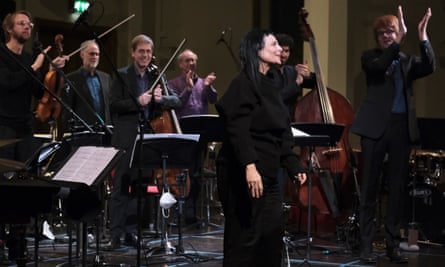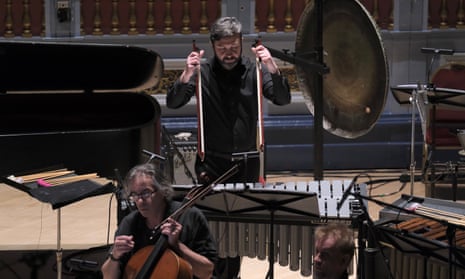Restricted to a virtual festival last year, the Huddersfield contemporary music festival has returned in-person to present their trademark boundary-pushing programme over a weekend. The second part of James Dillon’s protracted 70th birthday celebrations provided the focal point for Friday’s lunchtime concert. Dillon has long been a mainstay of Huddersfield programmes, giving festival audiences opportunities to hear the twists and turns of an elusive composing career mostly forged abroad.
Emblemata: Carnival, receiving its official world premiere, saw Dillon far removed from the “new complexity” label often attached to his music. Shrouded in darkness, enclosed by speakers and featuring the composer seated behind the sound desk, an interleaved mesh of lightly pulsing soundscapes, bursting instrumental lines and darting manipulated echoes followed.
Through the 40-minute work, members of Red Note Ensemble embarked on concertino-like wanderings in ones and twos, supported by Dillon’s electronic bedrock. Emblemata: Carnival isn’t Dillon’s most stridently esoteric offering; in a piece that had a bit of everything, lightly fluttering ensemble writing even added a touch of humour towards the end. Two contrasting works also featured in the programme: the gentle ramblings of Aileen Sweeney’s The Land Under the Wave and Five Phase Sphere by Australian composer Luke Styles, which began busy and spitting before consolidating in a Shostakovich-like stateliness.
That evening’s performance was less polite, mischievous grins flickering on the faces of Ensemble Musikfabrik as German composer Enno Poppe’s Prozession raised the roof. Poppe started work on Prozession in 2015, stopping eight minutes in. He returned to it during lockdown, resulting in a relentless 50-minute span. An epic essay for large ensemble, Prozession layers relentless waves of manic intensity, a feeling that continues even after the piece’s huge climax. All is sacrificed at the altar of flow, including, at points, the audience’s eardrums, as high brass and a quartet of percussionists let rip.

The Fabrication of Light by Israeli-American composer Chaya Czernowin (Huddersfield’s composer-in-residence this year) is similar to Prozession both in length and sheer forcefulness, though Czernowin takes a more thematic approach to structure. A recurring elegy with throbbing bass drum and Bartók pizzicatos anchors the piece, which spills out into corporeal variations involving breathing, whispering and embodied gestures you can feel growing in real time. Few living composers satisfy Goethe’s belief that “music is liquid architecture” more than Czernowin.
In its brazen intensity, Prozession convinces, as does the Fabrication of Light in its lucidly presented structure and ingenious touches (tap shoes are a wonderful addition to the percussion arsenal) but programming them together in the same concert is a mistake. Rapturous applause followed each piece, but even the most ardent Huddersfield supporter left the concert in need of a lie down in a darkened room.
More information on this year’s festival is here.

Comments (…)
Sign in or create your Guardian account to join the discussion